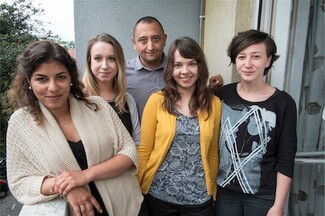"Give someone a camera and teach her how to use it, and she will have a very different status"

By PHILIP WOLMUTH
Above: the staff of Romedia Foundation on the balcony outside their Budapest offices. Picture: © Philip Wolmuth
FROM a small office overlooking a quiet Budapest street a remarkable grassroots group is reaching out across Europe, using film, television and social media platforms to give a voice to Romani people in Hungary and beyond.
The Romedia Foundation, with which the Rural Media Company has recently formed a partnership, was set up in 1992 to promote the positive perception of Romani ethnic identity, combat anti-Romani prejudice and provide alternative information to policy makers.
It began by producing academic publications, running summer camps for young Roma and making short documentary films. Over the years, film-making has become a central focus, with one of its most high profile collaborations, with Hungarian state broadcaster Duna TV, resulting in the prize-winning 42 part documentary series Mundi Romani, filmed in 27 countries over five years.
The summer camps have evolved into the Buvero programme, aimed at girls and young women, which also uses film-making as a tool. Last year, in cooperation with other NGOs working on Roma issues, the camps ran in Serbia, Germany and Hungary, resulting in eight films made by the participants, supported by professional film-makers. According to Executive Director Katalin Barsony, “Buvero is for girls and young women because, as a Romani woman, as I see the status of women in my community, I can see that we are the most unprivileged, because even our own families are using oppressive rules against us. To be a successful Romani woman in work on the professional side – this is very rare. If you give a camera to someone and teach her how to use it, she will be able to make films, and this will enable her to be the voice of her community, and gives her a very different status.”

Above: Katalin Barsony, Romedia's executive director, says that giving media training to Romani women enables them to be a voice for their people and "gives them a very different status"
There are usually seven or eight people at the desks crammed into the corners of Romedia's busy office, some pulled in for specific projects, others to work in its fully-equipped editing and post-production studio. The move to becoming an independent production company was a response to the increasingly hostile political and economic environment around the time of the 2010 election, in which the ruling Socialists were defeated by the conservative Fidesz party.
Roma in Hungary, who form an estimated 8% of the country's population of 10 million, face longstanding discrimination, and most live in great poverty. In recent years this has worsened and, according to Barsony, “there is now a climate of fear, a climate of oppression. Right-wing groups are getting more support and they are putting their representatives into positions of power and designing anti-Romani laws.” Following the election, 70% of Romedia's former colleagues at Duna TV were dismissed, and the Mundi Romani series cancelled. In response, the foundation started to fundraise for professional film-making equipment, and to produce its own films.
Its independent output includes Uprooted, a 22 minute advocacy film about current German repatriation policies seen through the eyes of three teenagers, which won a prize at the Al Jazeera documentary film festival. 3Brothers, about a Kosovar Roma family filmed over five years in Germany and Kosovo, will be released next year as a 72 minute theatrical release and a TV version. This will be the first production by Baxt Films, a for-profit production company which Romedia set up in 2013 – another new departure. It will be followed by Jazz Way Out, a movie about the East Gypsy Band that will be distributed by HBO Europe.
In addition to its website, Romedia's online presence includes four Facebook sites, a Wordpress and a Twitter account (@romedia1992), all run by Sinziana Marin, who points to its wide remit: “Our audience is Hungarian, but we also have Romanian and UK audience. We run these platforms mostly in English. We have an international reach and don't want to be just focussed on Hungary.”
Much of Romedia's work is accessible via these sites, including a series of more than 100 interviews with Romani women around the world, and many of the Mundi Romani films, of which 20 are available in English.
The partnership with the Rural Media Company and Traveller Times will bring all this to a new audience, and provide a much much-needed alternative to the negative images of Romani people currently prevalent in the UK media.